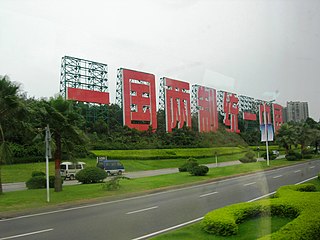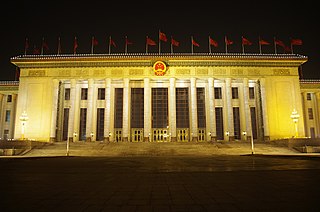
The politics of Hong Kong takes place in a framework of a political system dominated by its quasi-constitutional document, the Hong Kong Basic Law, its own legislature, the Chief Executive as the head of government and of the Special Administrative Region and of a politically constrained multi-party presidential system. The Government of the Hong Kong Special Administrative Region of the People's Republic of China is led by the Chief Executive, the head of government.

The special administrative regions (SAR) of the People's Republic of China are one of four types of province-level divisions of the People's Republic of China directly under the control of its Central People's Government, being integral areas of the country. As a region, they possess the highest degree of autonomy from China's central government. However, despite the relative autonomy that the Central People's Government offers the special administrative regions, the National People's Congress and its Standing Committee remains capable of enforcing laws for the special administrative regions.

"One country, two systems" is a constitutional principle of the People's Republic of China (PRC) describing the governance of the special administrative regions of Hong Kong and Macau.

The Government of the Hong Kong Special Administrative Region is the executive authorities of Hong Kong. It was established on 1 July 1997, following the handover of Hong Kong.

The Sino-British Joint Declaration was a treaty between the governments of the United Kingdom and People’s Republic of China signed in 1984 setting the conditions in which Hong Kong was transferred to Chinese control and for the governance of the territory after 1 July 1997.

The Regional Emblem of the Hong Kong Special Administrative Region of the People's Republic of China came into use on 1 July 1997, after the handover of Hong Kong from the United Kingdom to the People's Republic of China.

The handover of Hong Kong from the United Kingdom to the People's Republic of China was at midnight on 1 July 1997. This event ended 156 years of British rule in the former colony, which began in 1841.
Establishment Day, formally the Hong Kong Special Administrative Region Establishment Day, is celebrated annually on 1 July in Hong Kong, China since 1997. The holiday celebrates the transfer of sovereignty over Hong Kong from the United Kingdom to the People's Republic of China and the establishment of the Hong Kong Special Administrative Region. The similarly-named holiday in Macau occurs on 20 December, the day of its handover from Portugal.

Chinese nationality law details the conditions by which a person holds nationality of the People's Republic of China (PRC). The primary law governing these requirements is the Nationality Law of the People's Republic of China, which came into force on September 10, 1980.
The Government of the Macau Special Administrative Region, commonly known as the Macau Government, is the executive authorities of Macau. Formed on 20 December 1999 in accordance with the Sino-Portuguese Joint Declaration, it is headed by secretariats or commissioners and report directly to the chief executive. The affairs of the government are decided by secretaries, who are appointed by the chief executive and endorsed by the State Council of the Central People's Government in Beijing. As a special administrative region of China, Macau has a high degree of autonomy, in light of the "One Country, Two Systems" policy. The Macau Government, financially independent from the Central People's Government, oversees the affairs of Macau.

The handover of Macau from the Portuguese Republic to the People's Republic of China was at midnight on 20 December 1999. This event ended 442 years of Portuguese rule in the former settlement, which began in 1557.

Liangguang is a Chinese term for the province of Guangdong and the former province and present autonomous region of Guangxi, collectively. It particularly refers to the viceroyalty of Liangguang under the Qing dynasty, when the territory was considered to include Hainan and the colonies of British Hong Kong, the French Kouang-Tchéou-Wan and Portuguese Macau. The Viceroyalty of Liangguang existed from 1735 to 1911.

The British Consulate General Hong Kong (BCGHK), located at 1 Supreme Court Road, Admiralty, Hong Kong Island, is one of the largest British consulates general in the world and is bigger than many British embassies and high commissions. It is responsible for maintaining British ties with Hong Kong and Macau.

As of May 2024, there are 70 diplomatic missions in Hong Kong, of which 62 are consulates-general and 8 are officially recognised bodies in Hong Kong. As Hong Kong has the status of a Special Administrative Region of the People's Republic of China, some consuls-general in Hong Kong report directly to their respective foreign ministries, rather than to their Embassies in Beijing.

The Joint Declaration on the Question of Macau, or Sino-Portuguese Joint Declaration, was a treaty between Portugal and the People's Republic of China over the status of Macau. The full name of the treaty is Joint Declaration of the Government of the Portuguese Republic and the Government of the People's Republic of China on the question of Macau. Signed on 26 March 1987, the Declaration established the process and conditions of the transfer of the territory from Portuguese rule to the People's Republic of China. The Joint Declaration served also as the main source of fundamental rights that were implemented in the Basic Law of the Macau Special Administrative Region. The process was otherwise similar to the handover of Hong Kong to Chinese sovereignty by the United Kingdom in 1997.

The Sino-Portuguese Treaty of Peking was a trade unequal treaty between the Kingdom of Portugal and the Qing dynasty of China, signed on 1 December 1887. It is counted by the Chinese as among the unequal treaties in the aftermath of the Second Opium War. The treaty gave Portugal perpetual colonial rights to Macau on the condition that Portugal would cooperate in efforts to end the smuggling of opium.

Capital punishment in Macau was formally abolished in 1976 and reiterated in the Penal Code of Macau in 1995.

The Liaison Office of the Central People's Government in the Macao Special Administrative Region is the representative office of the State Council of the People's Republic of China in Macau.

Ma Man-kei was a Chinese-Macanese businessman, tycoon, entrepreneur and politician. A strong supporter of the Chinese Communist Party, Ma was a proponent of the transfer of sovereignty over Macau from Portugal to the People's Republic of China, which took place in 1999. Ma was Vice Chairman of the Chinese People's Political Consultative Conference's (CPPCC) eighth, ninth, tenth and eleventh sessions, beginning in 1993.

Hong Kong–South Africa relations refers to the current and historical relationship between Hong Kong, a Special Administrative Region (SAR) of the People's Republic of China, and the Republic of South Africa.















